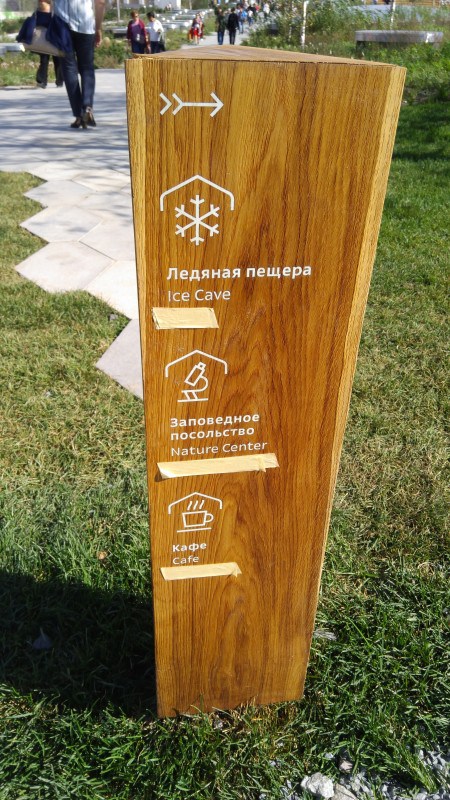Patriarchal homestead
« previous post | next post »
A tweet by Alex Gabuev:
"Patriarch's residence" is "Male chauvinist village." This translation is obviously a part of joint effort to subvert international order pic.twitter.com/A5DFS5pz6d
— Alexander Gabuev 陳寒士 (@AlexGabuev) September 13, 2017
The first translation on the panel (Northern Landscapes) seems all right, but both the Chinese and the English of the second are laughably off the mark.
The word “патриаршее” means “something that belongs to the Patriarch (of the Russian Orthodox Church)”. The original meaning of “подворье” is “inn”, “guest house”. However, in this context it means “residence” (the temporary residence) rather than a “farmstead”. Together, the phrase “патриаршее подворье” may be rendered as “Patriarch’s residence”.
For the Chinese, "zhòngnán qīngnǚ de nóngzhuāng 重男轻女的农庄" is a direct translation of the English, but taking the wrong meaning ("androcentric") of the mistranslated English word "patriarchal". A better translation of “патриаршее” (from Greek Πατριάρχης) would be zōng zhǔjiào 宗主教 (Patriarch).
[h.t. Don Clarke; thanks to Nikita Kuzmin]
Update: It looks like they've given on trying to translate from Russian to Chinese. First we had "Red intestines" (9/13/17), and now this photo taken on 9/19/17 in the same park as the one above:
[Thanks to Nikita Kuzmin]

J.W. Brewer said,
September 18, 2017 @ 12:36 pm
For purposes of the text corpora that machine translation generally works from, it seems plausible that the varieties of English in which "patriarchal" has become over the last few decades an inherently pejorative word have become more widespread than the specialized register of English in which Anglophone Orthodox Christians talk about ecclesiastical stuff, in which "patriarchal" remains neutrally descriptive or perhaps sometimes even positive.
mg said,
September 18, 2017 @ 1:44 pm
That may be true, but the translation should have been made directly from Russian to Chinese, rather than playing telephone as they march through languages. Just imagine what they'd end up with if they kept going through a few more sequentially?
J.W. Brewer said,
September 18, 2017 @ 1:52 pm
Turns out that if you ask google translate to render патриаршее into "Chinese (simplified)" you get 重男轻女 without needing to (explicitly?) go through an intermediate English stage, so maybe that's what they did?
J.W. Brewer said,
September 18, 2017 @ 2:04 pm
But I assume that with MT as with "real" translation these telephone chains don't get too long. E.g. if the translation staff at EU headquarters is obligated to translate a text from a comparatively obscure source language (let's say Finnish) into a comparatively obscure target (let's say Maltese) and the one person on staff who is fluent in both Finnish and Maltese is out sick (assuming generously that the number is one rather than zero), the translation is presumably routed through a single intermediate stage (mostly likely English, failing that perhaps French or German) rather than taking a random path via five or six intermediaries. Now Russian-to-Chinese by contrast with Finnish-to-Maltese seems like it shouldn't need that sort of intermediation because they are both pretty major tongues with considerable historical interaction, but I have no idea what's actually going on under the hood of the google translate machine.
Quinn C said,
September 18, 2017 @ 9:19 pm
When I ask for a translation from any other than the most common European languages into German, Google translate regularly makes mistakes that can only be explained by English homophones, "flatfish of my shoe", that kind of thing.
Alyssa said,
September 19, 2017 @ 10:11 am
Google Translate does use English as an intermediary step when translating: https://www.quora.com/Does-Google-Translate-use-English-as-an-intermediary-step-language-Spanish-English-Italian
As far as I know, the reason is simply that there's FAR more data available for English than any other language. This type of statistical translation is only as good as the data you feed it, and there's always more X->English data than X->anything else.
J.W. Brewer said,
September 19, 2017 @ 10:45 am
I should add that I didn't find "Patriarchal Farmstead" unacceptably clunky English in context. Maybe a bit clunky, but I guess I've had a reasonable amount of exposure to English-as-a-Second-Language phrases generated by Orthodox clergymen whose L1 is Russian and this doesn't strike me as *not* the sort of thing that could plausibly have been generated that old-fashioned human way rather than by underperforming MT.